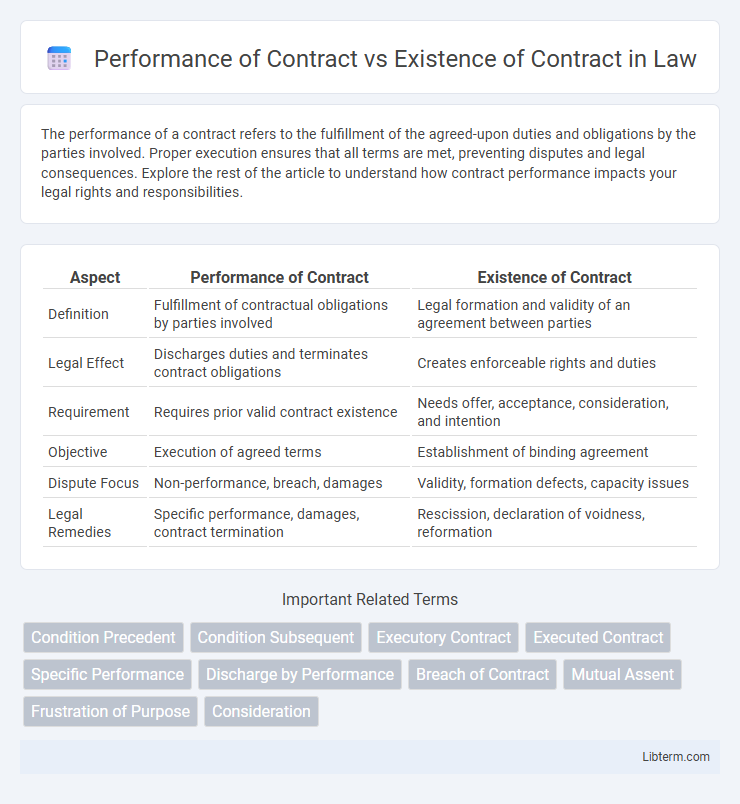The performance of a contract refers to the fulfillment of the agreed-upon duties and obligations by the parties involved. Proper execution ensures that all terms are met, preventing disputes and legal consequences. Explore the rest of the article to understand how contract performance impacts your legal rights and responsibilities.
Table of Comparison
| Aspect | Performance of Contract | Existence of Contract |
|---|---|---|
| Definition | Fulfillment of contractual obligations by parties involved | Legal formation and validity of an agreement between parties |
| Legal Effect | Discharges duties and terminates contract obligations | Creates enforceable rights and duties |
| Requirement | Requires prior valid contract existence | Needs offer, acceptance, consideration, and intention |
| Objective | Execution of agreed terms | Establishment of binding agreement |
| Dispute Focus | Non-performance, breach, damages | Validity, formation defects, capacity issues |
| Legal Remedies | Specific performance, damages, contract termination | Rescission, declaration of voidness, reformation |
Understanding Contract Existence
Understanding contract existence is essential for distinguishing between the performance of a contract and its formation. Contract existence requires offer, acceptance, mutual consent, and consideration, establishing the legal framework before any performance occurs. Legal disputes often hinge on proving contract existence, as performance obligations arise only after a valid contract is confirmed.
Legal Formation of a Contract
Performance of contract depends on the prior existence and valid legal formation of a contract, which requires offer, acceptance, consideration, and mutual intent. Without these essential elements, the contract lacks enforceability, rendering any attempted performance legally void or non-binding. Courts rigorously examine contract formation criteria to confirm legitimacy before assessing performance obligations or breaches.
Defining Contract Performance
Contract performance refers to the fulfillment of the obligations and duties specified within a legally binding agreement by the involved parties. The existence of a contract establishes the framework and terms that outline what performance is required, but actual contract performance involves executing those terms accurately and timely. Ensuring clear definitions and measurable criteria within the contract is essential for assessing whether performance has been achieved as agreed.
Key Elements Validating a Contract
Performance of contract requires fulfillment of agreed terms, while existence of contract depends on the presence of key elements validating a contract. Essential elements include offer, acceptance, consideration, mutual consent, lawful purpose, and capacity of parties. Without these elements, a contract lacks legal enforceability regardless of any attempted performance.
Distinction Between Existence and Performance
The distinction between the existence of a contract and its performance lies in the contract's formation versus the fulfillment of its terms. Existence refers to a legally binding agreement established through offer, acceptance, and consideration, while performance involves carrying out the contractual obligations as agreed. Understanding this separation is crucial in contract law to determine when a party has a right to enforce terms or claim breach.
Importance of Contractual Obligations
Contractual obligations are essential for ensuring the performance of a contract, as they define the specific duties each party must fulfill to achieve mutual agreement and legal enforceability. The existence of a contract alone is insufficient without the actual performance of these obligations, which validates the transaction and protects the parties' rights. Courts primarily assess the fulfillment of contractual duties to determine liability and enforce remedies, highlighting the critical role of specified performance in contract law.
Consequences of Non-Performance
Non-performance of a contract triggers legal consequences including damages, specific performance, or contract termination remedies under contract law. Courts often impose liability based on breach of contract principles, compelling monetary compensation to the aggrieved party for losses incurred. Persistent non-performance can lead to rescission, restitution claims, or reputational damage affecting future contracting opportunities.
Remedies for Breach of Contract
Remedies for breach of contract depend heavily on whether the contract has been performed or merely exists. When a contract is performed, remedies typically focus on compensating for defective or incomplete performance through damages or specific performance. If only the contract exists without performance, remedies often aim to enforce the contract's terms or rescind it to restore parties to their original positions.
Judicial Interpretation of Contract Performance
Judicial interpretation of contract performance centers on evaluating whether the obligations agreed upon by the parties have been fulfilled in accordance with the terms and intent of the contract. Courts examine the substantive actions taken by the parties, the timing, and the quality of performance to determine compliance and enforceability. Disputes often hinge on the distinction between partial and complete performance and the presence of conditions precedent or subsequent within contractual provisions.
Practical Implications for Contract Enforcement
Effective contract enforcement hinges on both the existence of a valid contract and the performance obligations stipulated within it. Courts prioritize actual performance and fulfillment of terms when resolving disputes, emphasizing evidence of executed duties over mere contract formation. Practical implications include the necessity for clear documentation of performance milestones and compliance to ensure enforceability and minimize litigation risks.
Performance of Contract Infographic

 libterm.com
libterm.com